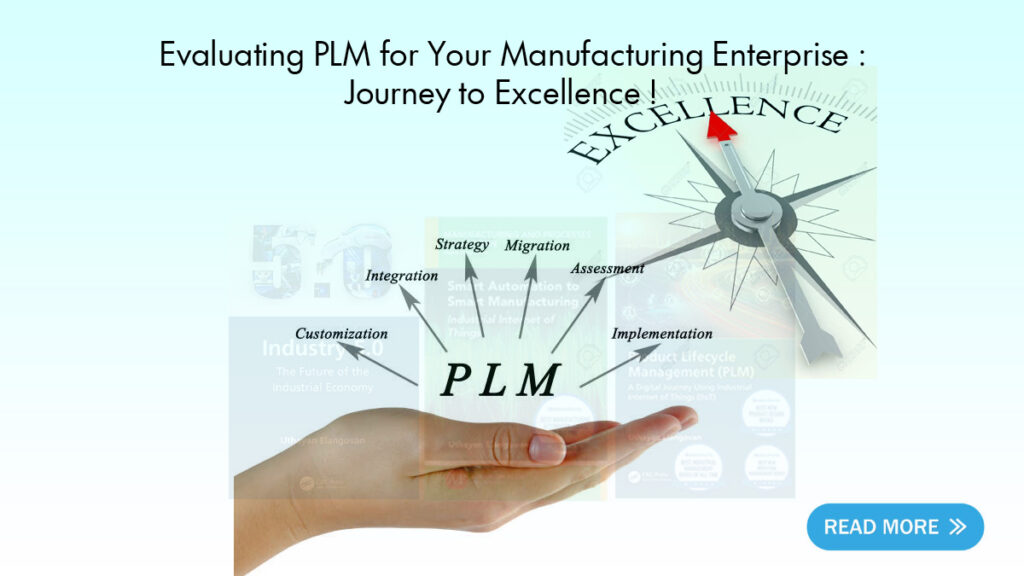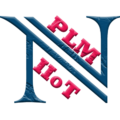Introduction:
Evaluating PLM for Your Manufacturing Enterprise : Journey to Excellence!
In today’s competitive manufacturing landscape, Product Lifecycle Management (PLM) has become an essential tool for enterprises to drive efficiency, innovation, and profitability. With the rapid advancement of technology and increasing complexity in product development, evaluating the right PLM solution has become crucial. In this narrative, we will embark on a journey with a fictional manufacturing enterprise, NSC Manufacturing, as they navigate the process of evaluating PLM and discover its transformative power.

The Catalyst for Change
NSC Manufacturing, a renowned automotive parts manufacturer, had been facing challenges in managing their product development process. Frequent design changes, miscommunication between teams, and delays in bringing products to market were hampering their growth. Realizing the need for a change, the management team initiated a quest to evaluate and implement a comprehensive PLM system.
Defining the Vision
The first step for NSC Manufacturing was to define their PLM vision and align it with their business objectives. They identified key pain points and desired outcomes such as reducing time-to-market, improving collaboration between teams, and streamlining change management processes. By setting clear goals, they could now evaluate PLM solutions based on their ability to address these specific needs.
NSC Manufacturing discovered a PLM solution that provided robust change management capabilities. They learned about another manufacturer in their industry that successfully reduced change-related delays by 30% after implementing this solution. This real-life example showcased the potential benefits they could achieve.
Evaluating Functionality
NSC Manufacturing knew that evaluating PLM functionality was essential to ensure it met their specific requirements. They formed a cross-functional evaluation team comprising representatives from engineering, manufacturing, procurement, and quality control departments. This team identified critical features such as CAD integration, BOM management, document control, and workflow automation as key evaluation criteria.
During the evaluation process, NSC Manufacturing discovered a PLM solution that offered seamless integration with their existing CAD software. This integration allowed their engineers to directly access and update product designs, eliminating manual data transfers and reducing errors. They spoke with a peer company that experienced a 20% increase in design accuracy and a 15% reduction in design cycle time after implementing this solution.
Scalability and Flexibility
NSC Manufacturing recognized the importance of scalability and flexibility in their PLM evaluation. They considered the future growth of their enterprise, potential expansion into new product lines, and the ability of the PLM solution to adapt to evolving industry standards. They evaluated vendors based on their track record in supporting large-scale implementations and their commitment to continuous improvement.
NSC Manufacturing learned about a global manufacturer that successfully implemented a scalable PLM solution across multiple sites worldwide. The solution enabled seamless collaboration and streamlined data exchange between locations, resulting in improved product consistency, reduced costs, and accelerated time-to-market. This example demonstrated the scalability and flexibility they desired.
Integration Capabilities
Integration with existing enterprise systems was a crucial factor for NSC Manufacturing. They evaluated the PLM solutions’ integration capabilities with their ERP system, MES software, and other critical business applications. They sought a solution that would enable data synchronization, provide a unified view of product information, and eliminate data silos.
NSC Manufacturing discovered a PLM solution that seamlessly integrated with their ERP system. They connected with a peer company that had successfully integrated PLM and ERP, leading to significant improvements in inventory management, accurate cost calculations, and streamlined order fulfillment. This example validated the importance of integration capabilities.
Return on Investment (ROI)
NSC Manufacturing recognized that evaluating the ROI of a PLM solution was essential to justify the investment. They calculated potential cost savings from reduced design iterations, improved collaboration, and faster time-to-market. Additionally, they considered intangible benefits such as enhanced customer satisfaction, increased market share, and improved brand reputation.
NSC Manufacturing studied a case study of an aerospace manufacturer that implemented PLM and achieved a 20% reduction in time-to-market and a 15% increase in customer satisfaction. This case study provided valuable insights into the potential ROI and convinced them of the long-term benefits.
Conclusion:
After an extensive evaluation process, NSC Manufacturing selected a PLM solution that aligned with their vision, addressed their pain points, and demonstrated strong real-time examples of success in the industry. The implementation of the chosen PLM system transformed their product development process, resulting in improved collaboration, reduced time-to-market, and enhanced competitiveness. NSC Manufacturing’s journey showcased the importance of evaluating PLM based on specific needs, functionality, scalability, integration, and ROI, ultimately leading them to excellence in their manufacturing enterprise.
Ready to revolutionize your manufacturing enterprise? Explore Neel SMARTEC‘s cutting-edge PLM services today and unlock your business’s full potential. Contact us for a consultation and start your journey towards manufacturing excellence.


